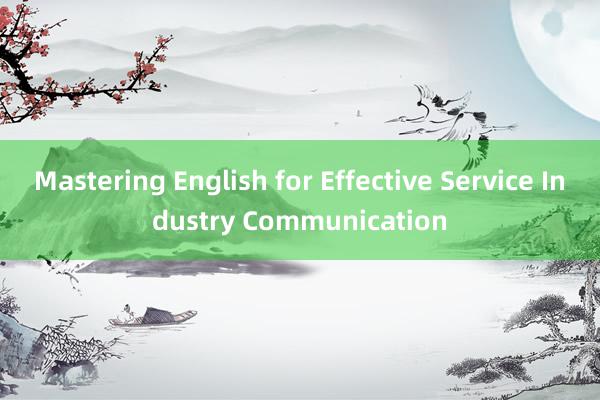Mastering English for Effective Service Industry Communication
发布日期:2024-09-19 11:02 点击次数:99
### Mastering English for Effective Service Industry Communication
In the globalized world, proficiency in English has become an indispensable skill for effective communication in the service industry. Whether you're managing a hotel, running a restaurant, providing customer support, or working in any other service-oriented profession, your ability to communicate clearly and professionally in English can significantly impact your success and the overall customer experience. This article aims to provide insights and strategies on how to master English specifically for enhancing your service industry communication skills.
#### 1. **Enhancing Vocabulary**
- **Industry-specific terms:** Learn and familiarize yourself with common terms used in your specific service industry (e.g., "check-in" in hospitality, "customer service protocols" in retail).
- **Customer-related expressions:** Master phrases related to customer interaction such as "May I help you?", 吴忠苑博有限公司-首页 "Can I confirm your reservation?", 好用笔记本网 and "How can I assist you further?".
- **Emotional language:** Develop a vocabulary that allows you to express empathy and understanding,武汉互赢网络科技有限责任公司 such as "I understand your frustration" or "Let's find a solution together".
#### 2. **Improving Pronunciation and Enunciation**
- **Practice regularly:** Use apps like Duolingo or Rosetta Stone to practice pronunciation and listen to native speakers.
- **Seek feedback:** Record yourself speaking and ask for constructive feedback from colleagues or language exchange partners.
- **Use visual aids:** Create flashcards with words and their pronunciations to reinforce learning.
#### 3. **Cultural Sensitivity**
- **Learn about cultural nuances:** Understanding different cultures' expectations and behaviors can prevent misunderstandings. For instance, in some cultures,悦会集采 direct eye contact is seen as disrespectful.
- **Adapt communication style:** Tailor your language and tone based on the client's background and preferences. Being aware of non-verbal cues is equally important.
#### 4. **Effective Listening**
- **Active listening:** Pay close attention to what customers say without interrupting. Paraphrase or summarize what they've said to ensure understanding.
- **Empathetic listening:** Show genuine concern for the customer's needs and feelings. Acknowledge their emotions and validate their concerns.
#### 5. **Writing Skills**
- **Email and message etiquette:** Learn the proper structure and tone for professional emails and messages. Always proofread before sending.
- **Documentation:** Improve your ability to write clear and concise reports, service policies, or FAQs.
#### 6. **Continuous Learning and Practice**
首页-新康索颜料有限公司- **Join language groups:** Participate in online forums or local meetups where you can practice English in a supportive environment.
- **Immerse yourself:** Watch movies, listen to podcasts, or read books in English to improve comprehension and vocabulary in context.
- **Regular feedback:** Regularly seek feedback from peers and supervisors to identify areas for improvement.
#### 7. **Technology Utilization**
- **Use translation tools wisely:** While translation tools can be helpful, they might not always capture the nuances of human communication. Use them as a supplement rather than a replacement for actual language skills.
- **Leverage technology for training:** Engage in online courses or use educational apps designed for language learners.
By focusing on these areas悦会集采, professionals in the service industry can significantly enhance their English communication skills, leading to better customer interactions, increased efficiency, and ultimately, greater job satisfaction and career progression.
